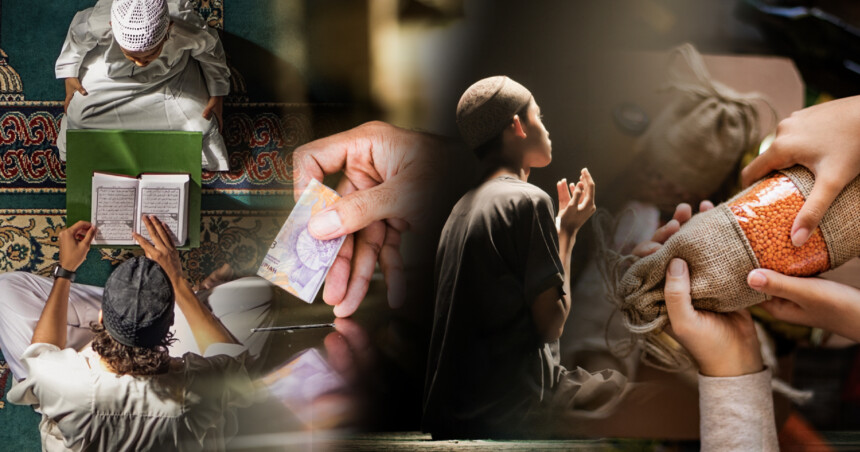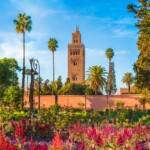In the name of Allah, the Most Gracious, the Most Merciful. All praise is due to Him, and may His peace and blessings be upon His final Messenger, Muhammad.
The world today is a troubling place. Muslims across the UK and beyond have been left feeling helpless in the face of mounting challenges, from Ummatic emergencies like the genocide in Gaza, to ethnic divisions in our communities and localities, to personal and family matters often related to disputes and finances.
Many of us may not have realised, but the first step towards addressing all of these grave concerns had been — and remains — right under our noses for the past few weeks.
Indeed, lessons learned from Ramadan can pave the way to real and lasting changes that benefit us as individuals, our wider communities, and the entire Ummah!
Ramadan is relevant all year round
Whether it’s over depends on how we view it
Ramadan may have passed, we have enjoyed the Eid salah and celebrated with our families, our friends, our brothers and sisters.
But this is not the end.
Ramadan is not something we put back in the cupboard for next year. Far from it.
Did the Sahaba (radiy Allahu ‘anhum) not spend the first half of the year before Ramadan asking Allah (subḥānahu wa ta’āla) to let them see another one?
Did they not spend the remaining part of the year thereafter begging Him to accept the past Ramadan from them?
We must make sure this blessed month benefits us throughout the year. And the first step is to ponder, to think.
Indeed, Allah repeatedly invites us to reflect in His Qur’ān, as He says in Surat Āl Imrān,
Surely in the creation of the Heavens and the Earth, and in the alternation of night and day, there are signs for men of understanding.” [1]
In this regard, there are four topics to think about and take forward after Ramadan:
- Understanding real freedom
- Acknowledging changes
- Awareness of time sensitivity
- Developing people.
These topics should be foremost in our minds when we attempt to take on any challenge, whether individual, communal, or Ummatic.
Understanding real freedom
Year in, year out, the month of Ramadan comes and shatters everything in this world that enslaves us.
We abstain from that which is usually halal to us — whether eating, drinking, or intimacy with our spouses in the daylight hours.
Not only that, we control our tongues and our actions. We do all we can to avoid haram, but we also rein in our lawful desires, and why? Simply put, because Allah (subḥānahu wa ta’āla) told us to.
Increased kindness
In seeking Allah’s acceptance and blessings, our character grows ever more generous in Ramadan.
We give more and more in charity, we spend in the way of Allah at home and abroad, and yet our income is the same in Ramadan as it is outside of Ramadan.
In this month, we understand that pleasing Allah is the most important thing we can do.
Reliance on Allah a part of freedom
As we wait to break our fast at Maghrib, we are reminded of our reliance on Allah and our dedication to Him, and that He — not our boss at work, not our national government, and none of the so-called “superpowers” and their “allies” wreaking havoc in the world right now — is truly in control of our affairs.
Our strength, our provision, and ultimately our success all comes from the blessings He has bestowed upon us, nothing reaches us except with His permission.
In Ramadan, we remember that with Allah on our side, we are completely free, no longer enslaved by our desires, our whims, our temperaments, or by the dirham and the dinar. Understanding this is the first step towards making real change.
For instance, does understanding the reality of our affairs not free us up to speak out more about the injustices in the world? Is knowing that we are free from the Dunya not a reminder that we can stand up for our rights as an Ummah? Should this not make us think about how we can mobilise and campaign to that end?
I am in no doubt that our Muslim communities in the UK and beyond have the power not only to address problems at home — like the British state Islamophobia that is the “Prevent” programme — but also to boycott, lobby, and advocate for our brothers and sisters abroad.
Our brothers and sisters who are suffering terribly at the hands of the Zionists, the Chinese Communist Party, Hindutva ultra-nationalists, and other oppressors.
Acknowledging changes
Solving these problems is possible.
Directly linked to this is understanding who our true Ruler is.
Allah (subḥānahu wa ta’āla) is in control of our affairs, and it is as if He has blessed us with Ramadan to show us that we are more than capable of realising the solutions to our problems with His permission.
A paradigm shift
Consider, for instance, how everything changes by Maghrib on the first night of Ramadan.
Believers come to the masjid to pray Isha, and stay for tarawīh, even if they do not usually come to the masjid for Isha outside of Ramadan!
The next day, and every fasting day thereafter, the one who would ordinarily feel “reliant” on coffee to function or get any work done gets up at the same time, works the same hours and manages just fine.
When the time to open the fast comes, a small number of dates and a few sips of water suffices this person, and he or she goes on to pray Maghrib without any complaints. Such people may stay in the masjid from Maghrib to Fajr, the whole night, but still work their usual shift the next day after a short nap!
Similarly, someone may not pick up their mushaf ordinarily, but then go on to complete at least one khatm of the Qur’ān during the month.
Ramadan reminds us that we can pray in congregation more, that we can spend more time with the Qur’ān, and that it is completely possible to change our mindsets, attitudes, and behaviours for the better.
Recognise that we can always improve
Acknowledging this is crucial, not only for improving both the quality and quantity of our personal ibādah, and strengthening ties within our communities, but also for highlighting to us that we can organise and change the wider world around us.
The noticeable increase in our acts of worship during Ramadan should remind us that we can and must challenge the status quo.
Coffee and the boycott list?
Think again about the fasting person who forgoes their morning cup of coffee.
Should this person not find it easy to boycott the coffee chains and other food and drink companies that support the Zionists as they steal from and murder our brothers and sisters in Palestine?
This is simply one example among many.
Muslim ruling “elites” are better called cowards
Muslims across the globe are constantly told that we cannot better a country or society ourselves, that our values and beliefs are not enough to rid us of corruption, that the only success stories come from secularisation and unbridled liberalism and consumerism.
We hear statements like this time and again, whether from non-Muslim leaders in Western countries, or from the ruling so-called “elites” in the Muslim-majority world.
In truth, I cannot understand why such people are ever referred to as “elites”. It would be a complement to call them cowards after 18 months of inaction and unwillingness to put even the slightest real diplomatic pressure or sanctions on the Zionists amid the genocide in Gaza.
And still, Ramadan reminds us year upon year just how capable of change we are, starting firstly in the personal sphere, then in our communities, and then beyond in the wider world.
Put these small improvements under a magnifying glass and consider how we could improve the world.
It is this mindset that we must adopt if we are to succeed as an Ummah, inshāAllah.
As our Rabb reminds us in the Qur’ān,
Allah does not change the condition of a people until they change what is in themselves.” [2]
Awareness of time sensitivity
How, then, are we to realise such visions, bi’ithnillāh?
As the old saying goes,
If you fail to plan, you plan to fail.”
Let us think about how Ramadan encourages us to plan.
The entire month is full of deeply time-sensitive worship. A worshipper may not eat even a minute after Fajr has arrived, and cannot eat iftar a minute before Maghrib comes in.
And Laylat al-Qadr is to be sought in the last ten nights. Once these moments have passed, they are gone. The matter is clear.
Whoever wants to succeed during the month has to plan: when to have suhūr; when to arrive at the mosque to pray Isha; when to take a nap; when to recite the Qur’ān and make extra dhikr and du’ā in addition to our usual work, family, and day-to-day schedules.
We are capable of great planning as an Ummah
As we see, Muslims have the ability to plan, and can succeed when we do.
Looking to the Sīrah of the Prophet ﷺ and the example of the Companions (radiy Allahu ‘anhum), is this not clear?
Our beloved Prophet Muhammad’s mission lasted 23 years (ﷺ). And, alhamdulillāh, he built an Ummah that is still standing today.
Abu Bakr (radiy Allahu ‘anhu) defeated the murtadīn and started expanding into Iraq and Syria in only two years — though at times it may feel like it takes two years to even start planning something today, that should not deter us!
Let Ramadan and these examples remind us of just how much we can achieve through the channels and means that Allah has given us today.
Moreover, let us not delay.
We must purify our intentions, plan, strive, and have patience that change will come.
Take every opportunity to make a difference and do what Allah asks of you. Trust in Him as the best Disposer of your Affairs — it is for Allah to decide when the victory comes. Not you.
Develop people, not buildings
Planning is key to community development.
But what — or who for that matter — should we focus on developing? Is it buildings, or the people within them?
We all love and enjoy beautiful masājid. We may even puff out our chests and say with pride,
The carpet is from this country, the calligraphy is from that country.”
We may also boast that our Imam has the most beautiful voice and can recite in all ten qirāt.
Pay attention to the attendees, not the structure
Everyone wants to have the best mosque.
But what about the people praying inside? It is these people who should be beautified by the masjid first and foremost, not the other way round.
As Muslims, we need to think about the original structure of Masjid al-Nabawī, with its roof of date-palm leaves that didn’t even stop the rain from coming in. Had the mosque stayed in its old form today, it would be amongst the smallest in the world.
The truth is, it doesn’t matter if you have an opulently decorated mosque, or an Imam with a beautiful voice… if people only come to enjoy the melody of the recitation and stare at the pretty tiles, yet leave having not understood a single ayah.
Where is the benefit?
No need for ethnically segregated mosques
Worse still, there are often groups and individuals calling for new mosques to be opened in areas that already have one or more.
They claim that there is a community need, but the sad reality is, they want a separate mosque for their own ethnic group, madhab, or jamah.
Meanwhile, many of the mosques we have are only full on Jumu’ah. Beyond that, they can barely manage a few rows at each prayer for the rest of the week. Do we really need more masājid in every case?
Can we really justify spending millions of pounds on bricks while our brothers and sisters are dying of starvation in Gaza, just so one ethnic group or another can have their own masjid?
Regrettably, people will pay to establish mosques, but organisations and charities that invest in people and could otherwise build up the much-needed advocates, activists, public speakers, debaters, and community leaders of tomorrow, sit at the bottom of the pile!
Investing in bricks or people?
When we look at the Sunnah, it is clear where the priority should be.
Have we forgotten that the Prophet ﷺ spent years building up his Companions in Makkah, long before there was a masjid?
Are these believers who he nurtured and educated in religious knowledge, good manners, and excellent character, not among the best examples for us as the Muslims of today to be following?
If this point is not already clear enough, let us also remember that the Prophet ﷺ himself was built up by Allah for 40 years before his prophethood!
Having strived to be closer to Allah and to follow the Sunnah of His Messenger ﷺ throughout Ramadan, we need to think, and we need to question ourselves.
Are we really investing in people? Or are we investing in bricks?
Projects are powerful
When we want to develop our brothers and sisters, projects are indispensable. And what better example do we have than Ramadan?
In fact, this past blessed month was a most complete and perfect project. We had a clear goal in mind, namely to attain taqwa, and — consciously or unconsciously — we consider the different aspects of it, whether spiritual, economic, communal, personal, or other, and take action based on these.
We may have considered questions like,
Where is my Sadaqa best spent?”
And,
Which friends and relatives can I invite for tarawīh?”
Or,
How can I make sure I catch Laylat al-Qadr?”
In essence, we set clear goals and looked for where we could expect successes and failures to arise.
Destroying disunity
Tarawīh truly showed our vast unity
Lastly, we should consider how building up our communities can unlock one of the greatest strengths our Ummah has at its disposal: unity.
In Ramadan, we often find ourselves worshipping Allah flanked by two people who are different than us in one way or another.
They may speak a different mother tongue or wear different clothes, they may follow another madhab or eat food that you dislike.
And yet, they stood with you as you prayed tarawīh. After all, none of us can start praying until the Imam says the takbīr, and no-one can start eating iftar before the Maghrib adhān begins.
Based on this, can we not work together on projects that benefit the whole community and, by extension, the wider Ummah?
Is the unity we see in Ramadan year after year not enough for us to see who our brothers and sisters in faith truly are?
New mosques built while current are mostly empty!
Can we now not move away from having mosques dominated by one ethnic community or pushing one madhab or tradition?
Do we not all feel devastated for the Muslims suffering in East Turkestan, Kashmir, Sudan, or Palestine? Are all these not our issues as an Ummah?
Can we not finally begin to understand that the borders we recognise were drawn by people who wanted to subdue us?
Do we really have to define ourselves within these boxes and allow this to divide us?
We have serious strength, do we see it?
How often does Allah remind us that we are an Ummah of thinkers, of activists, not an Ummah that is weak!
Does our current situation truly befit us and reflect the status Allah has given us?
Think about it, and what comes next. Start today, don’t leave it until next Ramadan.
And Allah knows best.
[1] al-Qur’ān, 3:190
[2] al-Qur’ān, 13:11









